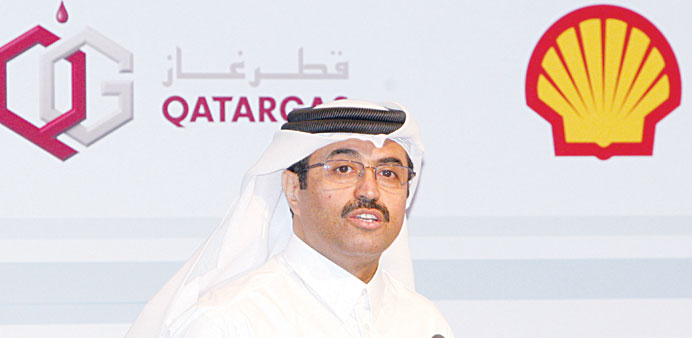By Pratap John
Chief Business Reporter
A right balance has to be found between development and environment to meet the growing energy demand from increasing population in the GCC region and elsewhere, said HE the Minister of Energy and Industry Dr Mohamed bin Saleh al-Sada.
The GCC population is expected to reach 53.5mn by 2020. This is a 30% increase over 2000.
In the same period, the real GDP of the six-member countries was expected to grow by 56%, al-Sada said in his keynote address at the 2nd Doha Carbon and Energy Forum at the Qatar National Convention Centre (QNCC) yesterday.
“Such intense growth will place unprecedented pressures on energy sources, as well as on energy-intensive water desalination. Effectively, adding more energy and greenhouse gas challenges.
“This requires a combined and collaborative effort by all concerned to forge essential partnerships on various levels to seek crucial carbon mitigation technological solutions, and perhaps to encourage investments in energy efficiency solutions in buildings, industry and transport.”
Al-Sada said there was a pressing need to reach the right balance between meeting the increasing need for energy on the one hand, and the requirements to mitigate the effects of greenhouse gas emissions, on the other.
“This requires the entire spectrum of energy stakeholders to work together to seek energy solutions among other objectives,” al-Sada said.
Qatar, he said, has “already identified the road ahead”.
Qatar National Vision 2030, which was guided and launched by HH the Emir, Sheikh Tamim bin Hamad al-Thani, was an “unambiguous road map” to ensure that “economic development and protection of the environment” are two demands neither of which should be sacrificed at the expense of the other.
QNV stipulates that “wherever there is an environmental cost to be paid for economic progress, it must be compensated with investments in technologies that help improve the environment.”
In reaching a balance between development and the environment, one was constantly reminded by the fact that more than 1.4bn people in the world had no access to electricity. This is about 20% of the world’s population.
On top of that, some 2.8bn people who use solid fuels for cooking and heating and 1.5mn who die each year from fumes and smoke from open cooking fires, mostly women and children.
“These frightening numbers were among the main motives for the global initiative launched by UN Secretary General Ban Ki-moon to help provide universal access to modern energy services; double the global rate of improvement in energy efficiency; and double the share of renewable energy in the global energy mix.
“We believe that natural gas offers an unparalleled opportunity to help in that effort. The environmental qualities of natural gas as well as its direct positive economic and social impact are of great importance in helping reduce CO2 gas emissions; and adjust the ecological, social, and economic systems in response to climate change,” al-Sada said.
The Doha Carbon and Energy Forum reinforces Qatar’s position as a centre of innovation and leadership in addressing issues vital to mitigating greenhouse gas emissions and their effects.
“This is important not just for us, or our region, but for the whole world at large,” the minister said.
According to the 5th Assessment report by the Inter-Governmental Panel on Climate Change, “warming of the climate system is unequivocal.” It said global carbon emissions, in the first decade of the 21st century, has been increasing at a rate more rapid than previously predicted.
“The possible impact of climate change is important for us here in the Gulf Cooperation Council, a region that is already affected by traditional environmental challenges such as desertification, and water scarcity,” al-Sada said. Page 36

Al-Sada delivering the keynote address at the 2nd Doha Carbon and Energy Forum, yesterday. PICTURE: Shaji Kayamkulam
